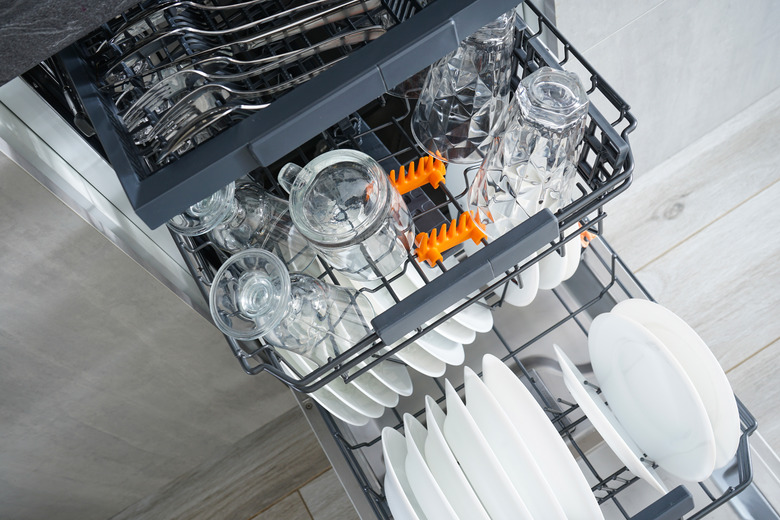The Dishwasher Scratched My Glasses
If your glasses came out of the dishwasher cloudy or looking scratched, you need to determine what type of damage the machine caused. Genuinely scratched glasses can't be repaired as such, but you may be able to reverse cloudiness caused by other problems. Learning how to prevent the problem in the future will keep your glassware crystal clear.
Scratched Glasses and Etching
Scratched Glasses and Etching
Scratching and etching are signs that your dishwasher is causing physical damage to your glassware. This is a progressive issue that worsens wit time. Early on, glasses may show a rainbow effect when viewed at certain angles in the light, or you may see individual fine scratches or pitting when you examine the glass closely. In time, the etching gives your glassware an overall whitened or frosty appearance. This white coating comes from the broad degradation of the glass itself, as the surface becomes scratched or pitted.
Sometimes this damage is caused physically, by excessively hot water, long cleaning cycles or prolonged heating during the drying cycle. Sometimes it's caused chemically, as soft or artificially softened water interacts with certain detergents to leech minerals from the glass and cause. It can also be caused physically, by glasses jostling each other during the wash cycle.
Hard-Water Film
Hard-Water Film
Sometimes, the white film that appears to be etching or scratches on your glassware actually comes from hard-water deposits settling on them in the dishwasher. As with etching the damage happens slowly over time, with repeated dishwasher cycles, and also likely appears on your silverware. Suspect this film as the culprit if you live in an area with hard water, especially if the water inside the machine does not reach at least 140 degrees Fahrenheit.
Although it's equally unsightly, hard-water film is just a surface deposit and doesn't harm the glass itself. This means it can be removed, restoring your glasses to their original brilliance and clarity.
Repairing the Damage
Repairing the Damage
You can revive drinkware to some extent, depending on the cause of the damage. Try removing hard-water film by soaking the glasses in white vinegar for 15 minutes, or using a commercial descaling product as directed by the manufacturer. Descaling products can be corrosive, so protect your hands by wearing rubber gloves. Be sure to rinse the glasses thoroughly before using them again.
There aren't any really effective home remedies for the permanent damage caused by etching. If you phone glass-cutting shops in your area, you may find one that's willing to give your glasses an acid bath. This can minimize the appearance of scratches and light etching, though it's not a complete repair. It's worth the cost if your glassware is intrinsically or sentimentally valuable, but not if the glasses can be cheaply replaced instead.
Preventing Future Damage
Preventing Future Damage
Keep your glasses from etching by lowering the amount of detergent you use, if you have softened water and take the glasses out of the machine before the heat-dry cycle starts. If your machine has a glass-washing or delicate cycle, use that for glassware to minimize the risk of pitting and etching. To prevent physical damage, some manufacturers offer optional protective glass holders. If those will fit your machine, by all means use them. Hand-washing your most delicate or valuable glassware, rather than running it through the machine, is a good idea.
To prevent hard-water film, use a food thermometer to ensure the water reaches at least 140 degrees Fahrenheit. That's usually necessary to properly dissolve the detergent, and prevent residues from settling on your glassware. Use a rinse agent in the dishwasher, and reduce the presence of minerals in your dishwasher itself by occasionally running it empty with a couple of cups of white vinegar or a descaling agent in the water.
